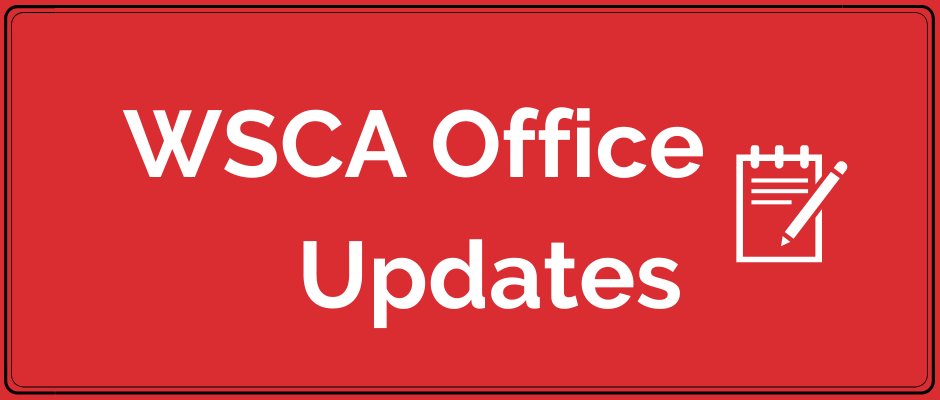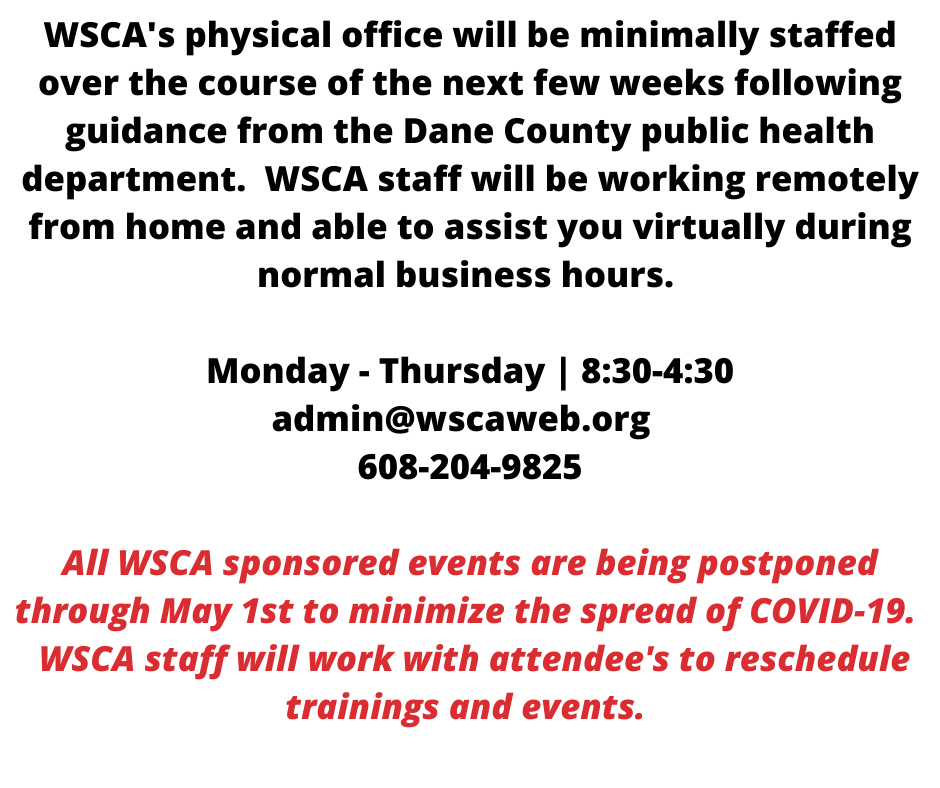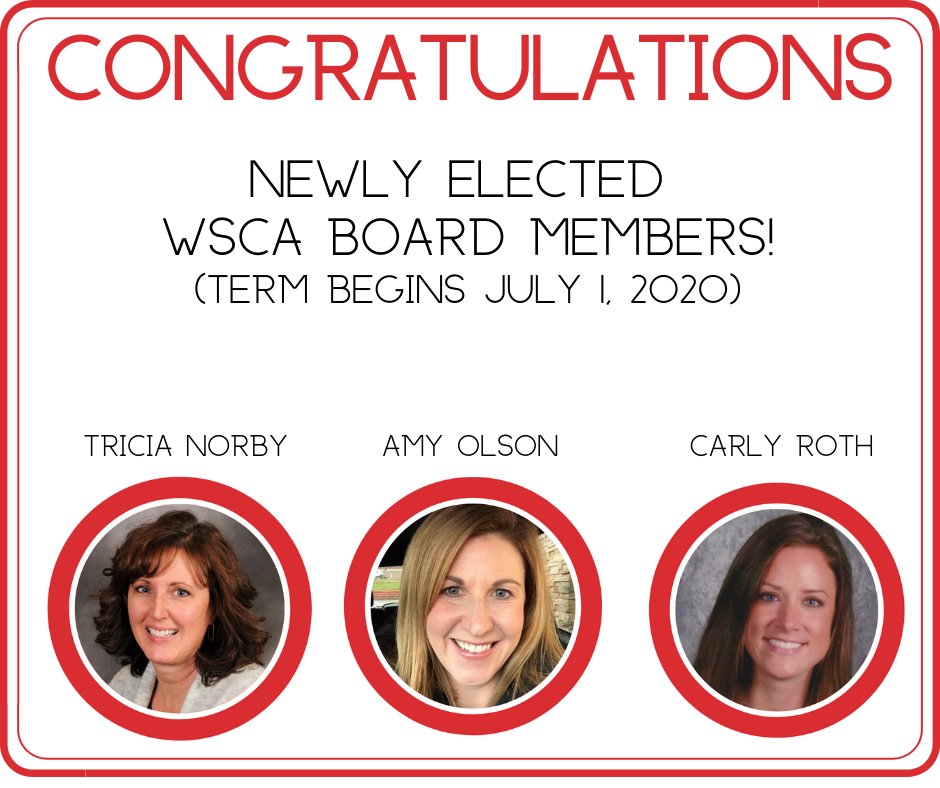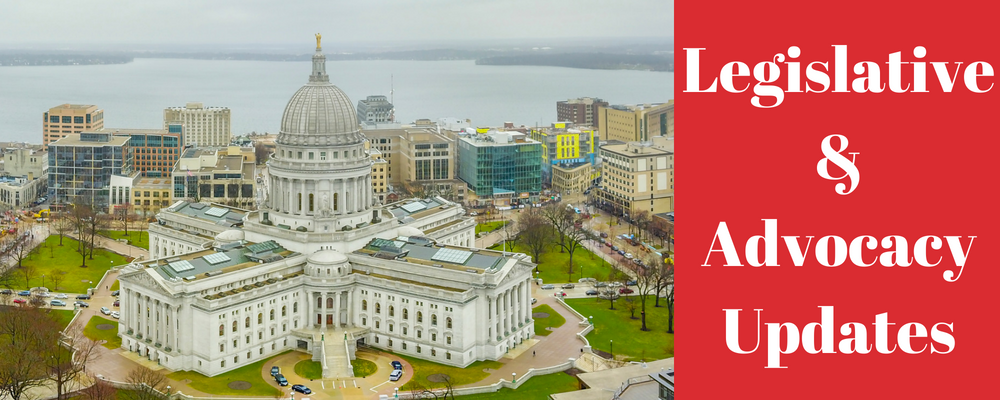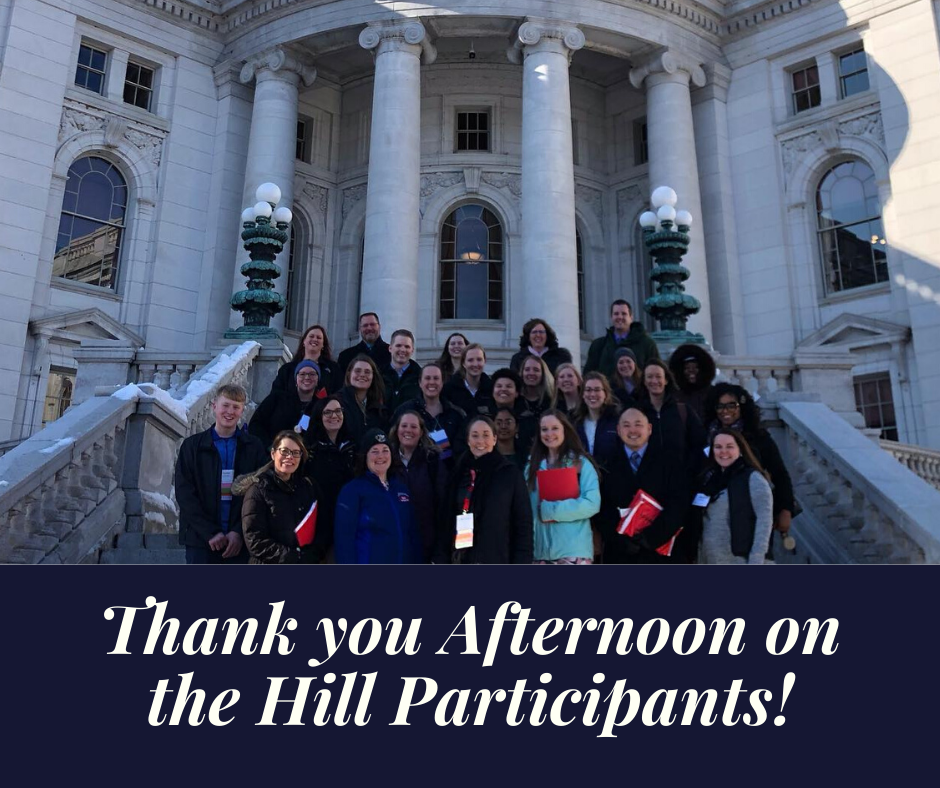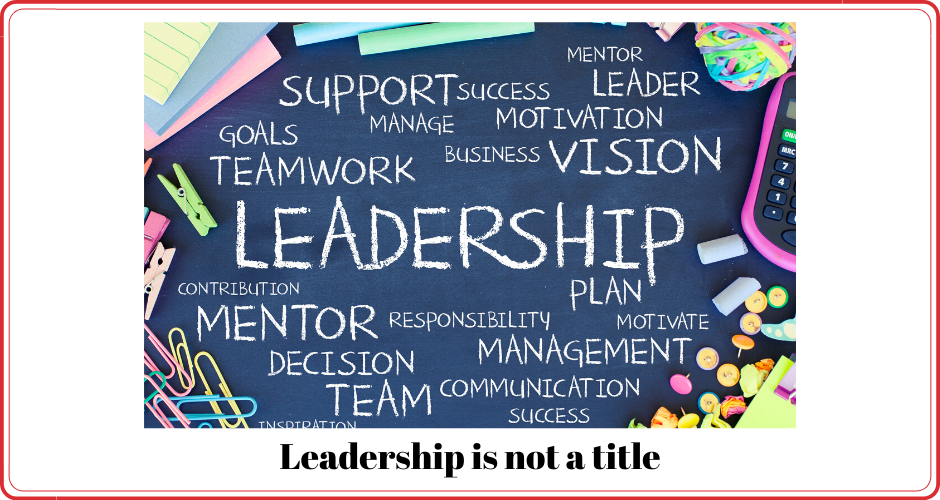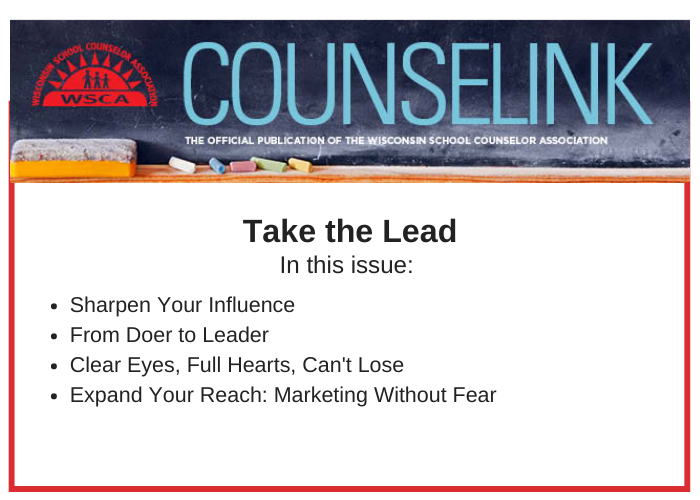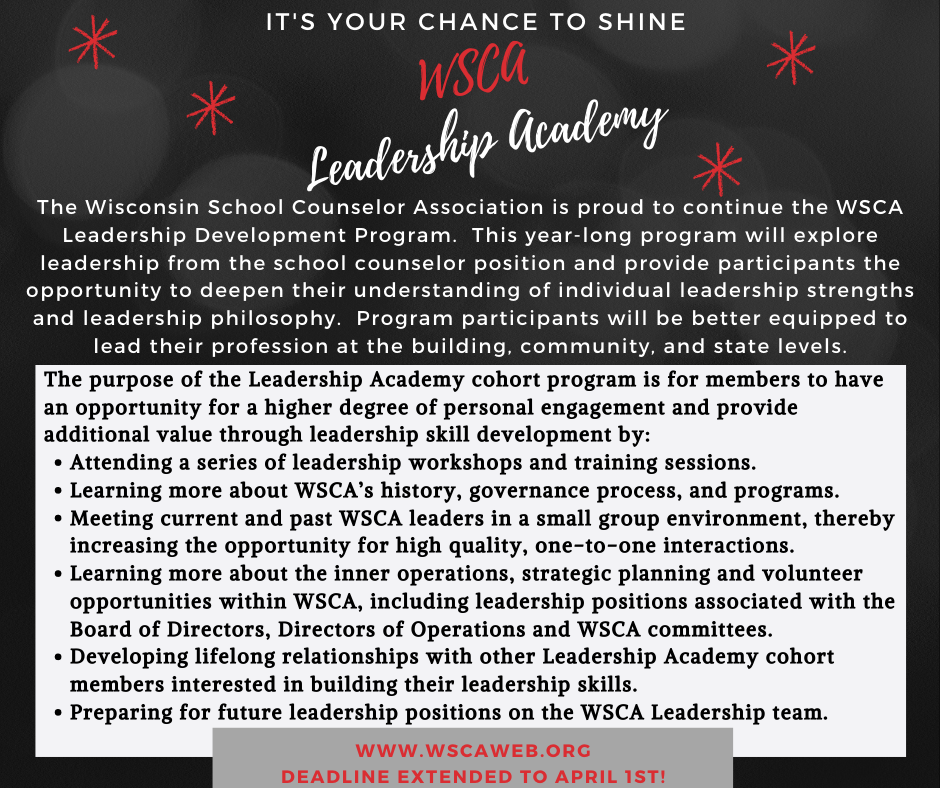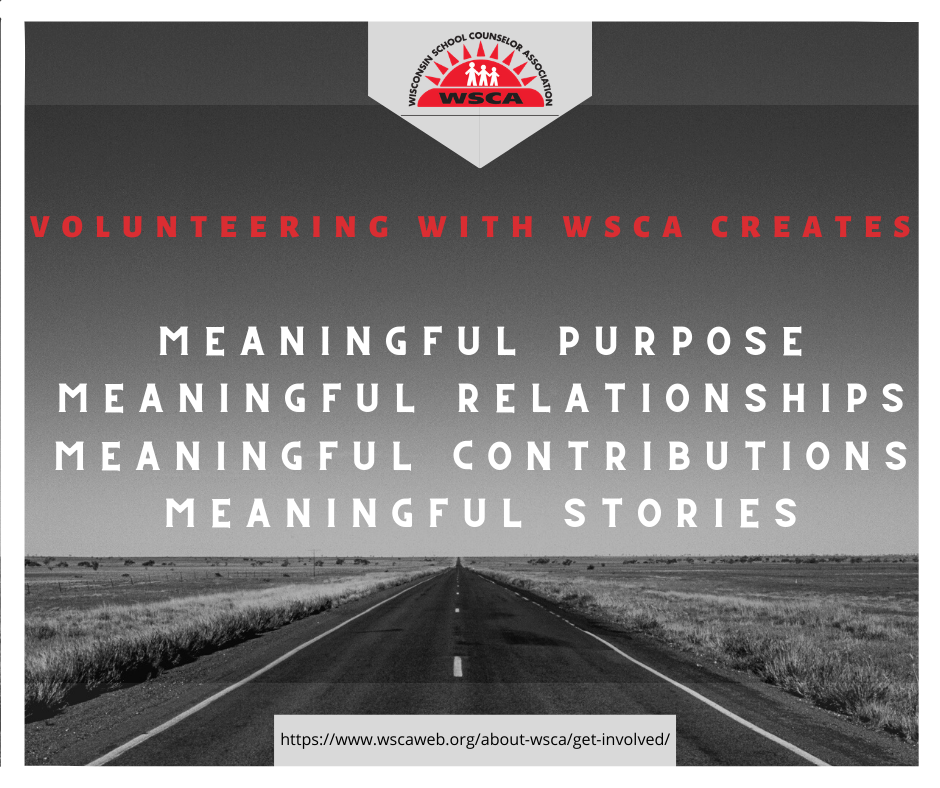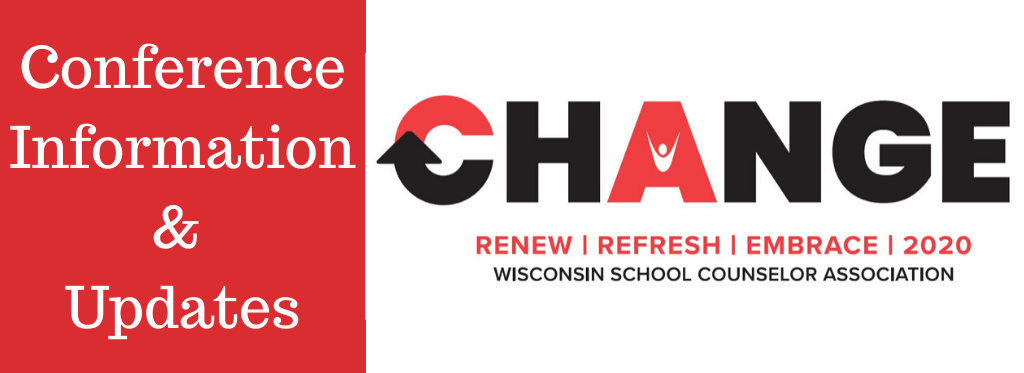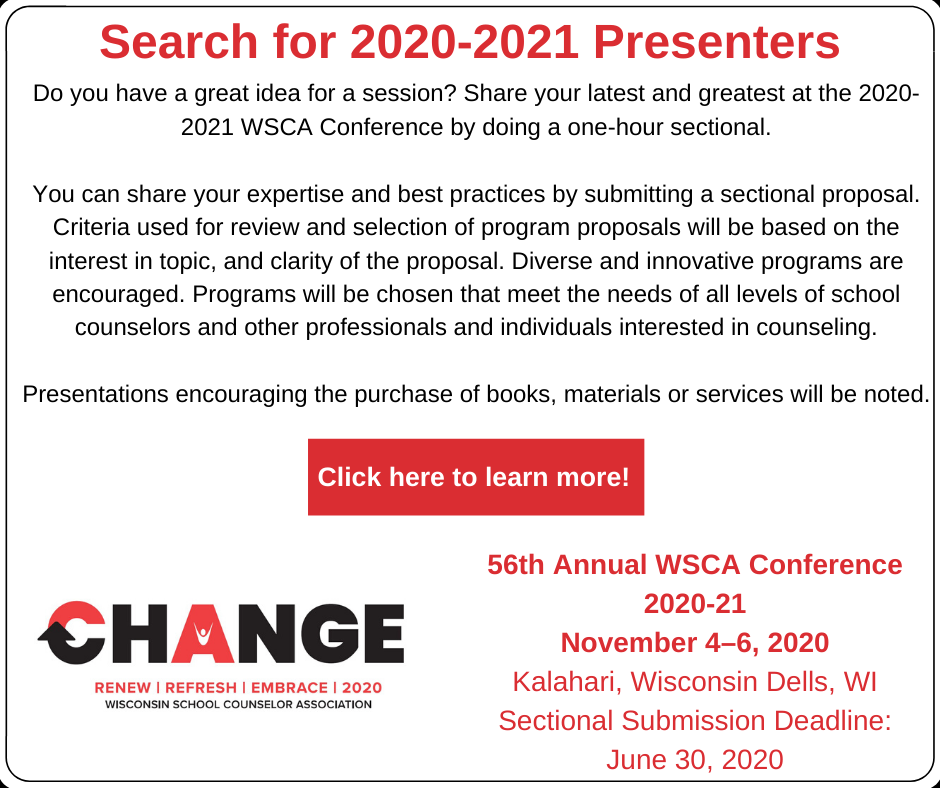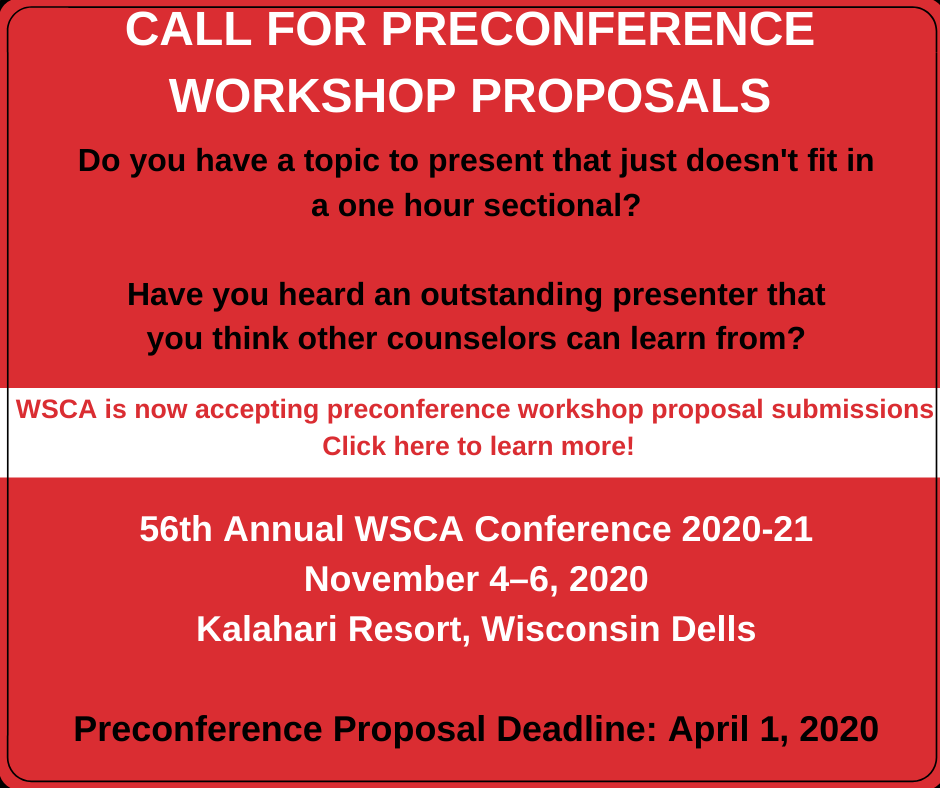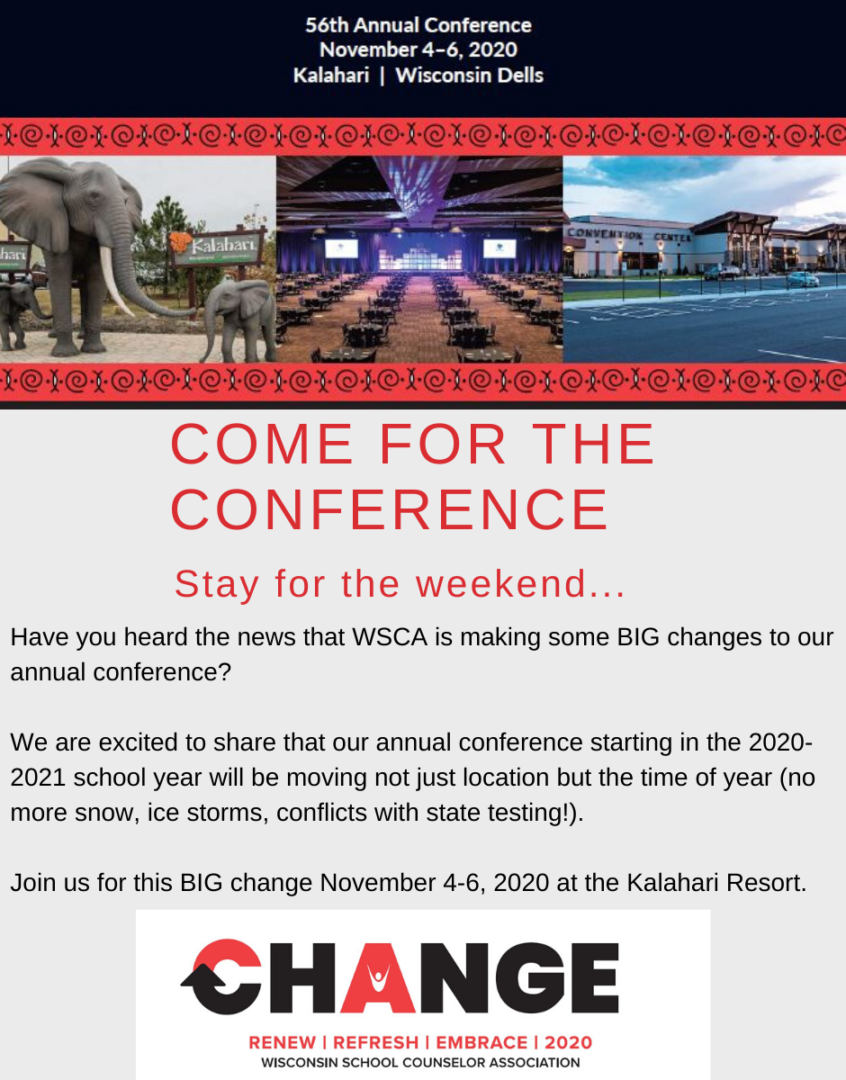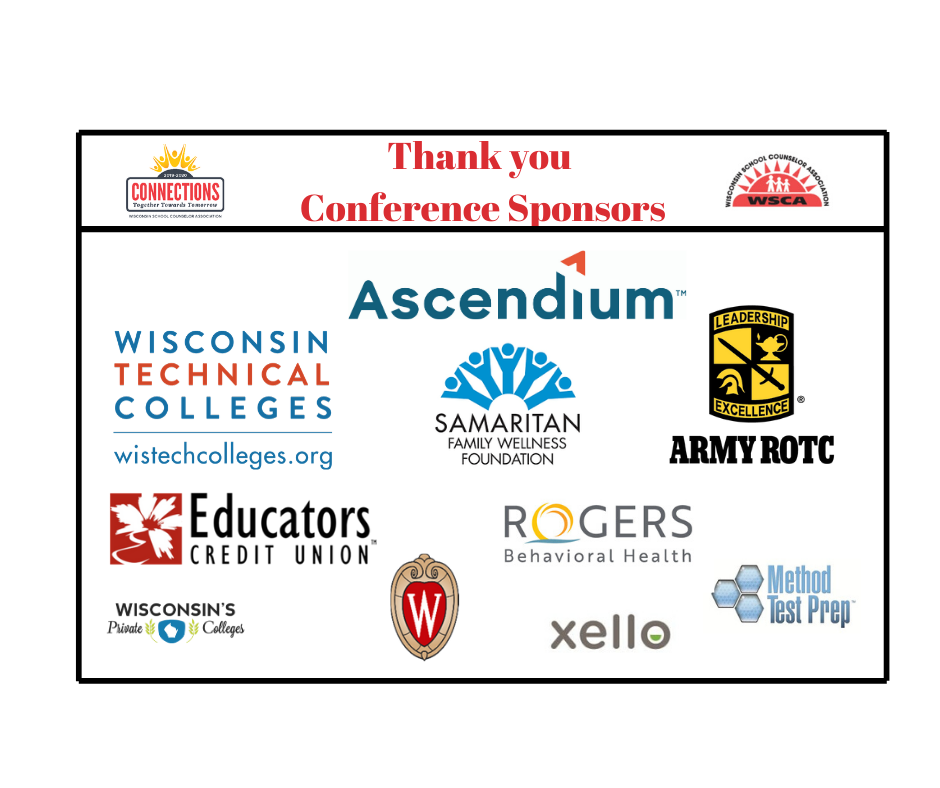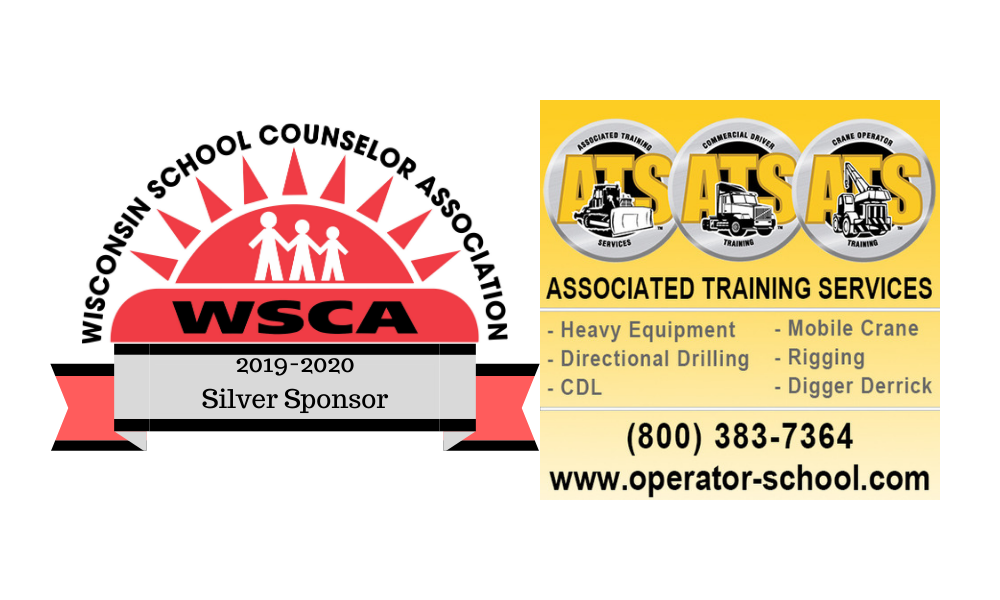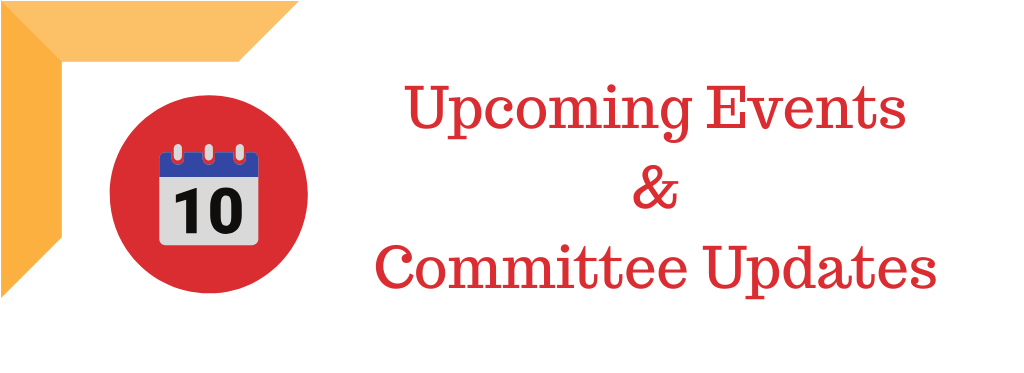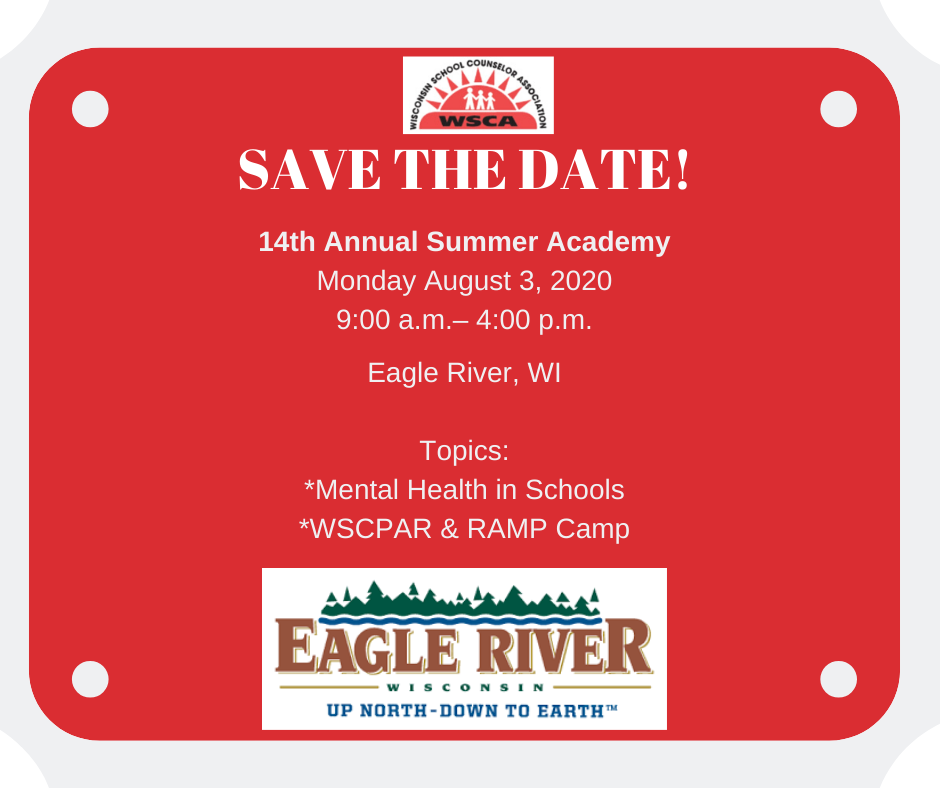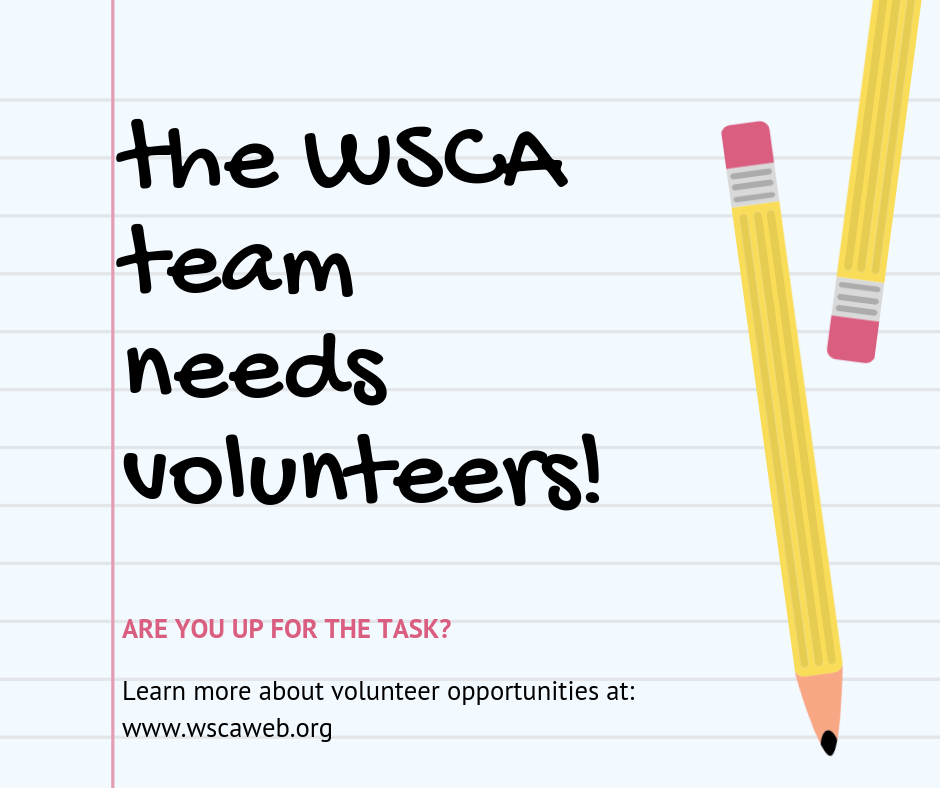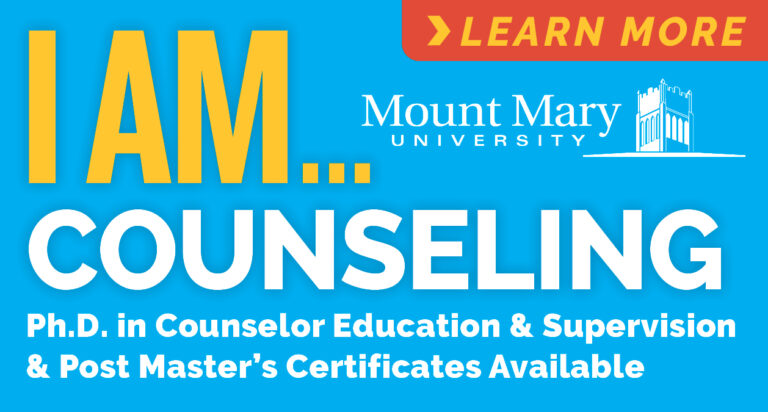March 2020

In This Issue:
- A Message from the Executive Director – Supporting Students & Families in Times of Uncertainty
- A Message from the WSCA Board
- Feature Article – COVID 19- Ever Evolving
- Legislative Update – Thank you Afternoon on the Hill Participants
- Leadership: More than a Title
- 2020-2021 Conference – Preconference & Sectional Presenters Needed!
- WSCA Professional Recognition Winner Highlights
- Summer Academy Save the Date
- WSCA Volunteers Needed
COVID 19 – Supporting Students and Families in Times of Uncertainity
Stacy Eslick, WSCA Executive Director
Dear WSCA Members,
There is great concern for our students, schools, and communities surrounding the COVID 19 (Coronavirus). Given this virus is so new and much is unknown, we often have more questions than we actually have answers due to the ever-changing information about the virus. The most recent information we have from Governor Evers/DPI is this K-12 SCHOOL CLOSURE FAQs document: https://dpi.wi.gov/sites/default/files/imce/sspw/pdf/K-12_FAQ_3.15.20_.pdf
As you are trying to plan for your students, there is SO much information being shared right now, consider what essential information do your students and families need at this moment? How will you distribute this information and have it available as families settle into being at home and socially isolating?
As you think about planning to meet the needs of your students in a virtual environment, the following questions and areas of consideration may assist you in preparing:
- Use software, programs, and platforms that are approved by your district (Schoology, google classrooms, etc.). Ask if your school has a program for meeting virtually face to face (google chat, zoom, etc.) – use the system approved and provided by your district.
- If you have google, talk to your administration about creating google voice phone numbers for counselors. These are then the property of your district and maintain personal/professional separation allowing you to talk with students without having to be in your school building.
- Establish set office hours and stick to them, communicate them frequently and often (include how to access crisis support if needed in autoresponders, website, google classroom, etc.).
- Consider the things you already do when there is a planned break, can any of those be used to support students during this time?
- Determine the frequency of contacts through the end of the year based on your current calendar and how you may be able to deliver this (recorded webinar, video, etc.).
- Consider the impact of closure and support needed for students needing access to services provided by your school (AP testing, ACT retakes, etc.).
- Establish online systems for things that may have typically been done in person or via your office (transcripts, summer school registration, etc.).
- Create protocols and systems for students who are not engaging in online course work. Who is responsible for contacting the student and family (teacher, counselor, dean, case manager, etc.) This type of learning is not for everyone and some of your students will struggle. How will this be monitored, will students fail classes, get incompletes, WD’s?
- If you have any student-athletes looking at playing college-level athletics are there any possible implications for approved courses?
Our email inboxes have been filling with resources on COVID 19 and safety precautions. Below are some additional resources that may be helpful to you specifically as a school counselor. WSCA will continue to share information and resources via social media as they become available so you can best support your students.
- ASCA resources on Coronavirus:
- ASCA Response to COVID 19
- Additional ASCA Resources
- ASCA Resource Guides on Virtual Counseling
- Planning for virtual counseling during an emergency shut down
- ASCA Ethics on virtual counseling – page 6:
- ASCA position statement on virtual school counseling:
- National Resources:
- CDC
- DOE
- NASP (National Association of School Psychologist)
- State Resources:
- Wisconsin DPI
- COVID 19 Resources
- District Planning and Implementation Resources for Continuity of Learning
- Wisconsin School Board Association (WASB)
- COVID 19 School Information and Resource Guide
- Grid created by school counselor based on Wisconsin feedback
Please make sure to follow WSCA on social media for the most up to date information and resources regarding this fluid and ever changing situation. Thinking of all of you during the next few days as you are supporting your students, families, staff and school communities.
Stacy
Andrea Donegan, WSCA Board Chair
Dyer Intermediate School, Burlington
Greetings ~
As I reflect on my experience as Board Chair for WSCA, I am honored and privileged to work alongside all of you to support the profession and thereby, our students along their journey. The issues being faced in education right now are tied tightly to the work that school counselors are doing every day in their buildings and with their students. SEL, character development, Trauma Informed Schools, PBIS, school climate and safety, post-secondary options, not to mention the Opioid epidemic, human trafficking, supporting EL learners, equitable access, and most recently supporting students and families amidst the COVID-19 pandemic. This is the short list, and yet, each and every topic is connected to the work that we do as school counselors to support our students and provide the best educational experience that will allow their light to shine, their talents to emerge, and their future success to be secured. No matter where we work, who we work with or for, and what we are assigned to do, we have an opportunity and obligation to fight the good fight and advocate for all of our students both at the individual and system level. The moment we signed on as school counselors we became school counselor leaders because that is what our job requires in order to fulfill our role. It’s certainly a journey, and 25 years ago when I began mine, the school counselor leader in me was a fledgling professional who couldn’t have done it without the support and guidance of an incredible mentor. So wherever you are in your journey, please pick up the baton and join with those around you – your school team, district cohort, WSCA, or other state and national organizations – to advocate on behalf of our students who sometimes have no one else to count on besides us for the support, services, resources, and opportunities that will give them a foothold on their futures. It is a historic time to be school counselors given the influence and impact we have to make a difference. Collectively, “we can change the world and make it a better place. It is in our hands to make a difference.” Nelson Mandela
Thank you for your dedication, your tireless efforts, and your deep commitment to students and education. Thinking of how reassuring it is that all of you are out there helping students and families during this challenging time navigating the realities of unexpected virtual education! They are in good hands…
With gratitude,
Andrea Donegan
COVID-19: Ever Evolving
Special Guest Author: Leia Eckstein, San Francisco Unified School District, CASC (California Association of School Counselors) Board of Directors
I am a school counselor working in San Francisco Bay Area and I work in a district that was one of the first districts in California to announce district-wide school closures. Being near the epicenter of the California Coronavirus outbreak resulted in early communication and decision making from the district office and county office of education. It appears that the rest of the state and county are following suit with California Governor Newsom announcing a state of emergency and mandatory quarantines for specific populations. Consequently, San Francisco USD in full swing of preparation perhaps a few days or weeks before the rest of the state and country. I personally began to explore online resources a week or two ago (seems like light-years) on such things as distance learning, notification to parents and lessons. Below is a link to some of these resources, however, keep in mind information and resource are rapidly changing. The breadth of information can be overwhelming to say the least. The six resources that I found most helpful are listed below.
The first two links are from the American School Counselor Association gives school counselor specific information including ethical guidelines along with additional resources from other national organizations.
The EdSource article contains a link to Elk Grove School District. This is the first district in California to close all schools.
The last three links pertain to online learning in the event of school closures. Since I began writing this article, my district, San Francisco USD announced a three-week school closure with plans being formed on staff responsibilities during this time. Our last day was Friday the 13th (March 13, 2020). Everyone in good health was required to report to school on Friday to prepare students for remote learning. Everything is evolving at a rapid pace but one thing is clear; we have an obligation to support our students through it all. Stay informed, be well, and please do not hesitate to reach out for additional guidance.
- ASCA: Planning for Virtual/Distance School Counseling During an Emergency Shutdown
- ASCA: Coronavirus Resources
- EdSource Article: Coronavirus Q & A: What California parents and students should know
- Google Educator Resources
- Share My Lesson: Remote Learning
- Education Companies Offering Free Subscriptions and other Resources
Leia Eckstein, M.Ed, NCC, PPS began her as a middle school special education teacher before pursuing school counseling. She has since worked as a high school counselor in Philadelphia, Brooklyn, and San Francisco. She currently serves on the Board of Directors for the California Association of School Counselors. Leia believes that schools provide the greatest opportunity for prevention, early identification, and intervention, and that school counselors are uniquely trained and best qualified to provide these services.
Leadership and School Counseling
By: Lisa Koenecke, WSCA Leadership Academy Co-Director, Lakeland University Adjunct Instructor
My first taste of leadership came in 5th grade. In our rural class of 11 students and a K-6 school under 65 students, I was chosen to be head safety patrol (glorified line leader, street crossing guard (only tractors & cows to watch for) and bus (3) identifier for the younger students. It was a big deal…the orange safety belt vs. the white one…big doin’s for Loganville Elementary.
I tried not to let that experience go to my head, but I got a taste for helping others which is what I define as leadership. The sad part of my rise to leadership experiences is shadowed by not wanting to be at my dysfunctional home. Yep, we’ve all been there. My escape turned into surrounding myself with strong, positive females who believed in my potential.
Some say leadership is natural, some say leadership is learned. What do you think? As a counselor educator for Lakeland University, and training the new generation of school counselors, I find myself asking more questions rather than offering answers. A HUGE shift in my leadership practice. This new generation of leaders are now teaching me!
The Wisconsin School Counselor Association has ample opportunities for leadership! Some of these opportunities include serving on committees, reading scholarship applications, sending out positive messages on social media and of course, serving on the board of directors. I had the honor to serve as WSCA’s President and on numerous committees (all but the research committee). After my term as WSCA’s Past President, I served on the American School Counselor Association (ASCA) board of directors for three years. LOVED it!
There is no magic formula for leadership. Some are quiet leaders, some are out front leaders, some leaders are readers and some leaders like green eggs and ham…just wanted to see if you were still paying attention. I can tell you that our profession is in need of YOUR leadership! If you are reading this, you have an inherent desire to lead. Please believe in your abilities.
As I teach the Lakeland graduate students the new ASCA model, I remind them that even though the words: Collaborate, Leadership, Advocacy and Systemic Change have been removed from the outside of the diamond, they are still important. Many times I would start my bio with being a collaborative leader advocating for systemic change. Please tap into your inner 5th grade leadership traits and help make school counseling the BEST profession it can be!
Lisa Koenecke



